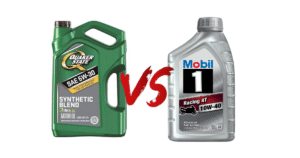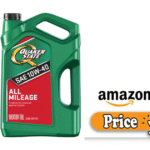Regarding motor oil, the debate between Quaker State vs Mobil 1 has been ongoing among car enthusiasts, mechanics, and everyday drivers.
Both brands have a rich history, a solid reputation, and a strong foothold in the automotive lubrication industry. Choosing the right engine oil is essential for maintaining engine health, boosting performance, and ensuring long-term reliability. With so many options on the market, it can be tough to know which brand stands out in the real world. In this article, we dive deep into the Quaker State vs Mobil 1 comparison to help you understand their differences and similarities.
With so many options on the market, it can be tough to know which brand stands out in the real world. In this article, we dive deep into the Quaker State vs Mobil 1 comparison to help you understand their differences and similarities.
We’ll examine everything from performance and design to build quality and real-world user experience, giving you an in-depth analysis backed by facts, insights, and personal experience.
Whether you’re a daily commuter, a DIY oil changer, or a weekend racer, this guide is built to help you make an informed decision.
What I Like
Quaker State
- Affordability: One of Quaker State’s strongest selling points is its competitive pricing. It often delivers great value without compromising essential quality.
- Durable Performance: Quaker State Ultimate Durability (now called Quaker State Full Synthetic) provides decent wear protection, sludge resistance, and overall engine cleanliness.
- Eco-Friendly Packaging: They have made strides in recyclable bottles and sustainability.
- Availability: Easy to find in most retail stores and auto shops.
Mobil 1
- High-End Synthetic Formula: Mobil 1 is renowned for its advanced full synthetic formula that offers top-tier protection and longevity.
- OEM Endorsements: Trusted by high-performance vehicle manufacturers like Porsche, Mercedes-Benz, and GM.
- Extreme Condition Stability: Works exceptionally well in both very high and very low temperatures.
- Extended Performance Line: Mobil 1’s Extended Performance series claims up to 20,000 miles of protection, reducing oil change frequency.
👉🏿👉🏻 Check Latest Price and Offer at Amazon 👈🏻👈🏿
What Could Be Better
Quaker State
- Brand Perception: Some drivers view Quaker State as a “budget option,” which may not reflect its actual performance in synthetic blends.
- Fewer High-Performance Variants: Quaker State lacks a wide variety of high-mileage or racing-specific formulas compared to Mobil 1.
- Limited OEM Certifications: While still API SN Plus and ILSAC GF-6 compliant, it’s not as often OEM-certified for European brands.
Mobil 1
- Price Point: Mobil 1 is on the pricier side, making it less appealing for budget-conscious users.
- Overkill for Older Engines: Some older vehicles may not need the high-end protection Mobil 1 offers, making it cost-inefficient.
- Availability in Rural Areas: Slightly harder to find in smaller towns compared to brands like Quaker State.
👉🏿👉🏻 Check Latest Price and Offer at Amazon 👈🏻👈🏿
My Personal Experience
I’ve used both Quaker State and Mobil 1 in various vehicles over the years, ranging from older sedans to modern SUVs and performance cars.
When I used Quaker State Full Synthetic in my older Honda Accord, I found the engine ran smoothly, with no noticeable consumption issues between oil changes.
It provided decent wear protection, and even after 5,000 miles, the oil didn’t appear too degraded. It’s an excellent choice for daily driving without pushing your engine to its limits.
On the other hand, when I switched to Mobil 1 Extended Performance in my newer Subaru WRX, the difference in throttle responsiveness and engine cleanliness was instantly noticeable.
Even after a long road trip with aggressive driving, the engine felt smoother, and oil analysis revealed minimal degradation after 8,000 miles.
So, while Quaker State held its own for general use, Mobil 1 truly shone in demanding conditions and higher-performance applications.
Design
The formulation and additive packages of both oils play a key role in their performance:
Quaker State:
- Utilizes synthetic base oils with proprietary additive technology.
- Focuses on anti-sludge and engine wear protection.
- Available in 0W-20, 5W-30, 10W-30, and other popular viscosities.
- Meets API SP and ILSAC GF-6 standards.
Mobil 1:
- Advanced full synthetic oil designed with multi-layer additive technology.
- Incorporates SuperSyn™ Technology for high-temperature oxidation control.
- Offers specialized formulations like Mobil 1 High Mileage, Extended Performance, and ESP Formula for European cars.
- Meets a wide range of certifications, including Dexos1 Gen 3, VW 502.00/505.00, MB-Approval 229.5, and more.
Mobil 1’s design philosophy leans more toward premium, high-spec applications, while Quaker State is tuned for broad, reliable coverage at a better price point.
Performance
Wear Protection
Independent tests show Mobil 1 consistently ranks higher in terms of wear metal reduction, particularly in high-RPM conditions.
Quaker State, while not far behind, excels in steady-state operation, meaning it’s more than sufficient for everyday driving.
High-Temperature Stability
Mobil 1 leads in high-temp performance, maintaining viscosity and preventing thermal breakdown under heavy loads or long drives in summer heat.
Quaker State holds up well, but thermal breakdown begins slightly sooner than Mobil 1 during stress tests.
Cold Start Efficiency
Both brands offer low pour points, but Mobil 1 0W-20 outperforms Quaker State’s equivalent in extremely cold climates.
Sludge Resistance
Both oils are highly resistant to sludge formation thanks to their detergent additives. However, Mobil 1’s base stock and advanced additives offer slightly superior cleaning power.
Build Quality
While “build quality” may seem like a misfit term for oils, it applies to purity, refinement process, and consistency in formulation:
Mobil 1:
- Made by ExxonMobil, one of the leading global energy and lubrication companies.
- Uses Group IV (PAO-based) base oils in many formulations.
- Excellent batch-to-batch consistency.
- Suitable for turbocharged, supercharged, and performance engines.
Quaker State:
- Owned by Shell, another global energy powerhouse.
- Mostly Group III hydrocracked base oils, which are refined but not true PAOs.
- Strong consistency and quality control, though a notch below Mobil 1’s premium standards.
Alternative Option
If you’re still unsure about Quaker State vs Mobil 1, here are a few alternatives worth considering:
- Castrol EDGE: Known for its titanium technology and strong performance in European vehicles.
- Pennzoil Ultra Platinum: Shell’s top-tier synthetic oil using natural gas-derived base stock. Comparable to Mobil 1 in many tests.
- Valvoline Advanced Full Synthetic: A reliable choice offering great performance for high-mileage and newer engines.
- Amsoil Signature Series: A premium synthetic that even outperforms Mobil 1 in some extreme-condition tests.
Each of these has its strengths and could be a perfect fit depending on your engine type and driving habits.
Final Thought
The Quaker State vs Mobil 1 debate comes down to what you value most:
- If you’re looking for reliable protection, decent performance, and a budget-friendly price, Quaker State Full Synthetic is a fantastic choice.
- If your priorities include top-tier engine cleanliness, extreme performance, OEM certifications, and extended drain intervals, Mobil 1 leads the pack.
For everyday drivers, Quaker State more than suffices. But for enthusiasts, those with newer vehicles, or anyone living in extreme weather conditions, Mobil 1 provides peace of mind through its advanced formulation.
At the end of the day, both oils are API and OEM-certified, which means you’re not putting your engine at risk with either. The choice depends on how you drive, where you live, and how much you’re willing to spend.
FAQs – Quaker State vs Mobil 1
1. Is Mobil 1 better than Quaker State?
Yes, Mobil 1 generally performs better in lab and field tests, especially in extreme conditions and long intervals. However, for typical driving conditions, Quaker State holds up very well.
2. Can I switch between Mobil 1 and Quaker State?
Absolutely. As long as they meet your vehicle’s viscosity and certification requirements, switching brands is safe.
3. Does Quaker State meet Dexos1 Gen 3?
Yes, Quaker State Full Synthetic meets Dexos1 Gen 3 specifications, making it suitable for modern GM engines.
4. How often should I change oil with Mobil 1?
Mobil 1 Extended Performance allows up to 20,000 miles under ideal conditions. However, a safe general rule is every 7,500–10,000 miles, depending on driving habits.
5. Which is better for high-mileage engines?
Mobil 1 High Mileage offers superior seal conditioners and cleaning agents, but Quaker State High Mileage is also a solid, more affordable choice.
6. Is Quaker State owned by Shell?
Yes, Quaker State is a subsidiary of Shell, one of the world’s largest oil companies.





